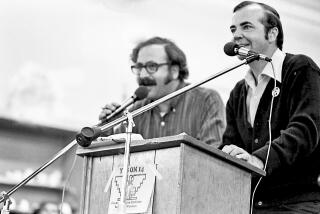Olof Palme: Socialism Was Moral Passion
- Share via
The horrible suddenness of Olof Palme’s death meant that the obituaries in the American press were hastily assembled, and more one-dimensional than usual.
There were the conventional words of praise for an assassinated leader, perhaps a reference or two to his determined opposition to America’s role in Vietnam. One conservative newspaper explained carefully how Palme’s leftism had led to his defeat in the mid-1970s--but neglected to note that he had led his party to victory twice in this decade, the last contest in 1985 being a stunning triumph against difficult odds.
There was hardly a hint in those obituaries of the almost always rumpled, yet extremely intense and deeply committed, socialist I had met in 1969 and worked with from time to time over the years.
His socialism was a moral passion. I remember him at the Congress of the Socialist International in Portugal in 1983, giving a speech about his conversations with unemployed men and women that burned with a sense of the devastating psychic consequences of being out of work. Afterward, when we chatted, he came back to his point as if it were a memory of personal anguish.
He was being, one might say, very “Swedish.” He was, after all, the leader of the party that, more than any other in the Western world, made full employment a central priority. Yet when he was in the United States on a private visit in 1970, already prime minister, and no one from the U.S. government would even meet with him because of his opposition to the Vietnam War, he told me that it was his student experience in this country, his concern for the American poor, that played a significant role in forming his socialist convictions.
His commitment to the Third World, and particularly to Africa, had the same existential quality.
Only last June the International met at Boomsersvik, the Socialist youth camp not far from Stockholm, to discuss peace and the world economy. Palme, without a tie and with his granny glasses cocked at an angle, presided at the opening session.
At a dinner that night in the rustic dining room, Palme sat across the table from former West German Chancellor Willy Brandt, his friend and mentor. Next to Brandt sat Michael Manley, the former prime minister of Jamaica. Agapito Aquino, brother of slain Philippine opposition leader Benigno S. Aquino Jr., was at Palme’s side.
Palme joked about his days in the youth movement, yet he also kept talking about how disarmament might free the funds for a truly concerted effort to end poverty in the Third World. For him, the personal, the moral and the political were of a piece.
The quintessential memory, though, goes back to Stockholm in 1970. There was that magnificent democratic informality that was to lead to his death: While waiting for an elevator at the party headquarters, my wife was joined by two men who walked in from the street, the prime minister and his predecessor (who died only last year), Tage Erlander.
Later, at the University at Lund in southern Sweden, there was “Prime Ministers Night.” The gym was packed to the rafters, the band played the “Internationale” and the “Stars and Stripes Forever,” and the chief of state walked in alone and sat down at a little table. The students had elected 10 of their number to question him. Most of them were, as befit those hectic times, Maoists.
They denounced Palme as a sell-out, a social democratic traitor to the working class, and demanded that he advocate violent and radical overthrow. Palme replied patiently but with great force.
He was not, he said, a pacifist. Yet he understood the limits of violence, the fact that socialism itself could be built only by nonviolent cooperation, by consensus and participation. After the seizure of power in the Third World, he continued, what did many revolutionaries do? They went to Sweden to ask help in creating a medical system for the people or in building an education system.
That memory of a wonderful, rumpled, implacably logical and infinitely compassionate man makes it all the more utterly senseless that he was taken away from a world that desperately needed him. And still does.
More to Read
Sign up for Essential California
The most important California stories and recommendations in your inbox every morning.
You may occasionally receive promotional content from the Los Angeles Times.











